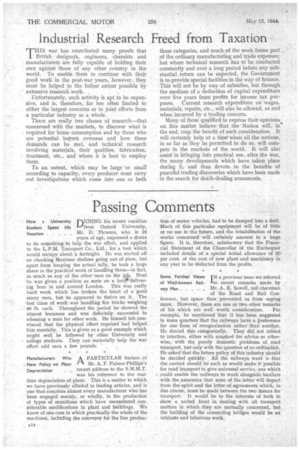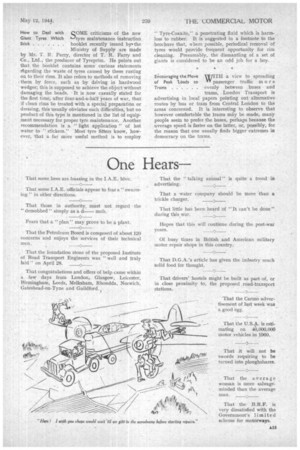Passing Comments
Page 16

Page 17

If you've noticed an error in this article please click here to report it so we can fix it.
• How a University r1TIRINGhis recent vacation Student Spent His 1--ffrom Oxford University, Vacation . . . Mr. D. Parsons, who is 18 years of age, expressed a desire to do something to help the war effort, and applied to the L.P.M. Transport Co., Ltd., for a task which • would occupy about a fortnight-. He was started off on checking Morrison shelters going out of store, but apart from keeping the actual tally, he took a large share in the practical work of handling them—in fact, as much as any of the other men on the job. Next he was given a position as mate on a lorr? delivering beer in and around London. This was really hard work which has broken the heart of a good many men, but he appeared to thrive on it. The 'last class of work was handling fire bricks weighing 40 lb. each. Throughout the period he showed the utmost keenness and was definitely successful in releasing a man for other work. He himself felt convinced that the physical effort required had helped him mentally. This is given as a good example which might well be followed by other University and college students. They can materially help the war effort and earn a few pounds.
Manufacturers Win A PARTICULAR feature of
New Policy on Plant Mr. A. F. Palmer Phillips's Depreciation recent address to the S.M.M.T.
was his reference to the wartime depreciation of plant. This is a matter to which we have previously alluded in leading articles, and is one that concerns almost every manufacturer who has been engaged mainly, or wholly, in the production of types of munitions which have necessitated considerable modifications in plant and buildings. We know of one case in which practically the whole of the machines, including the conveyor for the line produc
tion of motor vehicles, had to be dumped into a field. Much of this particular equipment will be of little or no use in the future, and the rehabilitation of the works concerned will certainly amount to a huge figure. It is, therefore, satisfactory that the Financial Statement of the Chancellor of the Exchequec included details of a special initial allowance of 20 per cent. of the cost of new plant and machinery in any year to be deducted from. the profits.
Some Further Views IN a previous issue we referred of Well-known RailIto recent remarks made by way Man •Mr. A. E. Sewell, rail chairman of the Road and Rail Conference, but space then prevented us from saying more. However, there are one or two other remarks
of his which are well worth consideration. For example, he mentioned that it has been suggested in some quarters that the railways have a preference for one 'form of reorganization rather than another. He denied this categorically. They did not intend to interfere, either with unasked for advice or otherwise, with the purely domestic problems of road transport, but only with the question of co-ordination. He asked that the future policy of this industry should be decided quickly. All the railways want is that the control should be such as would make it possible for road transport to give universal service, one which could enable the railways to work alongside hauliers with the assurance that none of the latter will depart from the spirit and the letter of agreements which, in due course, 'must be made between the two means for transport. It would be to the interests of both to show a united front in dealing with all transport matters in which they are mutually concerned, but the building of the connecting bridges would be an intricate and laborious work. SOME criticisms of the new tyre maintenance instruction booklet recently issued by. the Ministry of Supply are made by Mr. T. R. Parry, director of T. R. Parry and Co., Ltd., the .producer of Tyreprim. He points out that the booklet contains some curious statements rbgarding the waste of tyres caused by these rusting on to their rims. It also refers to methods of removing them by force, such as by driving in hardwood wedges; this is supposed to achieve the object without damaging the beads. It is now casually stated for the first time, after four-and-a-half years of war, that if clean rims be treated with a special preparation or dressing, this usually obviates such difficulties, but no product of this type is mentioned in the list of equipment necessary for proper tyre maintenance. Another recommendation is a " light application" of hat water to "stickers." Most tyre fitters know, however, that a far more useful method is to employ
How to Deal with Giant Tyres Which Stick • . . . . " Tyre-Coaxite," penetrating fluid which is harmless to rubber. It is suggested in a footnote to the ;brochure that, where possible, periodical removal of tyres would provide frequent opportunity for rim cleaning. Presumably, the dismantling of a set of giants is considered to be an odd job for a boy.
Encouraging the Move WITH a view to spreading of Peak 'Loads to WV passenger traffic more Trams evenly between buses and trams, London Transport is advertising in local papers pointing out alternative routes by bus or tram from Central London to the areas concerned. It is interesting to observe that however comfortable the trams miy be made, many people seem to prefer the buses, perhaps because the average speed is faster on the latter, or, possibly, for the reason that one usually finds bigger extremes in democracy on the trams,




















































